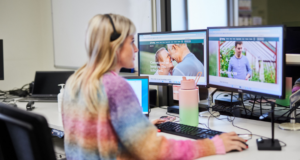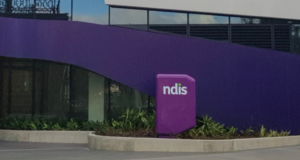Ten things you might not know about Down syndrome
You’ve probably heard that Down syndrome is a lifelong genetic condition with no cure, but what does that really mean and how does it affect people’s lives?
Although there is no national data collection, Down Syndrome Australia estimates that there are between 13,000-15,000 people living with Down syndrome in Australia.
Today we take a closer look at Down syndrome and share some facts you might not know. How is it diagnosed? What are the symptoms? How many people in Australia have Down syndrome? Can people with Down syndrome work? How do I talk to someone with Down syndrome?
The more we know, the easier it is to communicate with and support people with Down syndrome, contributing to a more inclusive community.
How does Down syndrome occur?
Down Syndrome Australia explains that:
“Our bodies are made up of trillions of cells. In each cell, there are tiny structures called chromosomes. The DNA in our chromosomes determines how we develop. Most people have 23 pairs of chromosomes in each of their cells (46 in total). People with Down Syndrome have 47 chromosomes in their cells. They have an extra chromosome 21, so Down Syndrome is also sometimes known as trisomy 21.”
Down syndrome symptoms
Some of the symptoms of Down syndrome are:
- Some level of intellectual disability
- Some characteristic physical features
- Increased risk of some health conditions (many of which are treatable)
- Some developmental delays
Down syndrome is typically diagnosed pre-birth
One in every 1,100 babies born in Australia has Down syndrome. That’s approximately 290 new babies born each year with Down syndrome.
In Australia, pregnant women are offered non-invasive screening for Down syndrome to see if their baby is at increased risk.
If the screening test shows an increased risk, further tests are offered to make a definitive diagnosis.
If Down syndrome is not diagnosed before the child is born, doctors will usually identify a baby as having some features common to Down syndrome and a blood test is done for confirmation.
People with Down syndrome can live long healthy lives
Thanks to medical progress, people with Down syndrome are staying healthier and living longer. As recently as the 1950s, life expectancy for people with Down syndrome was as low as 15 years of age.
Now, thanks to progress in medical and social sciences, people with Down syndrome’s health and quality of life has improved significantly. In Australia today, most people with Down syndrome will enjoy a long, happy and healthy life with an average life expectancy of 60 or older.
People with Down syndrome work, study and socialise
Like the general population, people with Down syndrome enjoy being productive, independent, and keen to participate in mainstream life.
Through different employment and support options and, more recently, the NDIS people with Down syndrome have the opportunity to work full or part-time while other people fill their week with rewarding activities, such as volunteering, study, hobbies and social events.
People with Down Syndrome are not always happy
There’s a stereotype that people with Down syndrome are consistently happy. However, like most of us, people with Down syndrome feel a full range of emotions – happy, angry, sad, embarrassed or excited.
While it’s a fact that every person with Down Syndrome has a degree of intellectual disability, they also have unique personalities.
In fact, HealthDirect states that people with Down Syndrome are at a higher risk of mental health conditions rather than always being happy.
People with Down syndrome are at risk of developing health problems
As Down syndrome affects the immune system, people with the condition are more susceptible to common illnesses and infections. HealthDirect states that even with a healthy diet, people with Down syndrome are more likely to be overweight and have a higher risk of sight and hearing problems, problems with their bones and gut defects. Therefore, it is imperative to follow Covid-19 health regulations when caring, supporting or socialising with people with Down syndrome.
How to communicate with people who have Down Syndrome
The best way to talk to people with Down Syndrome is with everyday language and respect – just like anyone else.
It’s best to speak directly to the person with Down Syndrome, not to a carer, friend or family member that’s with them. Allow them time to respond and provide an opportunity to let you know how they communicate best.
Remember that every person with Down Syndrome is unique, just like you and me. Each with their individual personality, abilities and support requirements.
You can learn more about communicating with people with Down syndrome through this Fact Sheet produced by Down Syndrome Australia.
Down syndrome and the National Disability Insurance Scheme
Under seven years old, kids with Down syndrome are automatically eligible for Early Childhood Early Intervention (ECEI) under the NDIS.
The main goal of an ECEI plan is to support families with their child’s development, wellbeing and community involvement.
Most ECEI plans focus on early intervention therapies such as speech therapy, occupational therapy, and physiotherapies. Sometimes plans include funding for low-cost assistive technology.
People with Down syndrome over seven are not automatically eligible for the NDIS. However, many people who apply are accepted to the scheme.
When you apply, you will be asked to give evidence of your eligibility to NDIS, including your age, address and proof of your disability. It is not enough to only provide evidence of having Down syndrome. You must give evidence that your condition affects your everyday life and functioning. You can read more about your eligibility for the scheme and what proof you need to apply.
We hope you feel more informed and empowered to interact, communicate with, and support people with Down Syndrome by reading this article.
Through tailored programs, inclusive communities, positive support from family and quality health care, we can help people with Down syndrome lead fulfilling and productive lives.
Do you need support services?
Lifely is a leader in the disability field. Its team of experienced staff have proudly been delivering a range of supports for almost 40 years, making the everyday better for people with Down syndrome.
If you live in the regional Victoria, New South Wales or South Australia and would like to discuss what disability supports and inclusive community programs are available in your region, please contact our friendly team to discuss how we can help you or your family.
Find out how about Down syndrome by visiting the Down Syndrome Australia website




